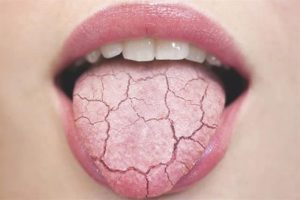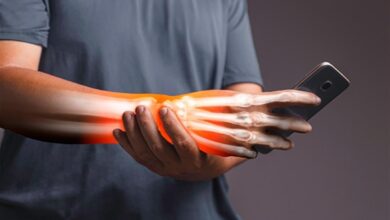For pregnant women… signs that you are suffering from dehydration in the summer

1
This extremely hot summer wave will have its effects on the health of all categories of people, young and old, and pregnant mothers as well, as women can suffer during pregnancy, especially in hot weather, from many problems, including dehydration, as it is linked to several complications, most notably the stimulation of early labor or the premature birth of the fetus before It is premature and its occurrence increases if the woman does not follow healthy practices related to hydrating the body with water and fluids. Doctors have proven that the recommended safe amount for a pregnant woman should range between 3 to 4 liters per day to avoid many health risks.
Dehydration in pregnant women in the summer


Dehydration in pregnant women in the summer
Although the temperature rises to high levels may make people vulnerable to heat illnesses such as heat exhaustion and heat stroke, the pregnant woman is more disturbed in light of these difficult-to-bear conditions, as this comes in light of her weak immunity, which increases her chances of becoming dehydrated at such times. If you are pregnant and suffering from dehydration, you will feel extremely thirsty along with a feeling of dizziness and dizziness, especially if you have severe dehydration, which affects the transparent fluid surrounding the fetus, which is known as amniotic fluid, which begins to decrease as a result of the lack of water supply from the body, announcing the premature birth of the fetus.
It is important to know that the mother’s dehydration during pregnancy does not only depend on the stage in which she is pregnant with her child, but rather the situation continues until after the child is born, and the breast milk, which the child depends on for nutrition to supply him with various nutrients, is affected, as milk levels are weak, as water is one of the basic components of milk. .
Dehydration exposes women to a great deal of danger, as water plays a participating role in helping the fetus grow, so its quantity must be appropriate in the bodies of pregnant women, which works to prevent the risk of congenital malformations in the fetuses.
Therefore, if the doctor’s examination confirms that the pregnant woman suffers from severe dehydration, this means that she has a significant loss of body fluids. Therefore, it is always a common procedure to install rehydration solutions along with taking care to meet the body’s need for fluids and natural fruit juices.
Read also: If a pregnant woman drinks lemon juice and the consequences of this matter
Warning signs that a pregnant woman is suffering from dehydration
There are many symptoms resulting from a woman feeling dehydrated during pregnancy, including:
1- Dry mouth


Dry mouth
If you are completely uninterested in drinking water during your pregnancy, then you are putting yourself at risk of dry mouth, which has a negative impact on the function of the salivary gland, reducing saliva secretions, resulting in dry throat and difficulties in chewing food, in addition to a bad odor from the mouth.
2- Constipation


Constipation
It is among the common digestive disorders resulting from indigestion and bowel movement difficulties, although it may be due to hormonal factors as a result of the influence of hormones accompanying pregnancy, specifically an increase in progesterone levels, which slows down the process of food passing through the intestines, causing the stool to harden. Its stiffness and difficulties in expelling it, but lack of drinking water and moisturizers is also one of the main factors for its occurrence
3- Vertigo and dizziness


Vertigo and dizziness
You may feel more tired and exhausted compared to a woman who is not pregnant, and your household tasks may even pile up on you due to the physical fatigue you feel, which will increase especially during pregnancy and in light of the intense exposure to the sun’s rays and the feeling of extreme heat, which causes a feeling of heaviness in the head, dizziness, dizziness, and lack of balance.
3-Feeling extremely thirsty
Your body will be in need of constant replenishment of water during pregnancy, and you will have to compensate for the lost fluids, especially since water is an essential element in the formation of blood, which must be delivered with sufficient amounts of fluids to the fetus through the placenta, and your body temperature also rises during pregnancy. It makes you feel very thirsty
4- Severe headache


Headache
There is a close relationship between suffering from dehydration and a pregnant woman’s feeling of severe headaches, specifically migraines that focus on one side of the head, in addition to sinus headaches and tension headaches. It is one of the most common annoying problems that pregnant women can face, and with exposure to it, the woman becomes hypersensitive to sound sources. And the light
5- Dark urine
A noticeable decrease in the amount of urine secretions will be observed, in addition to changes in its color, which become clear in its dark color
6- Dry skin
Dehydration will bring with it negative effects on the health of the skin in the form of loss of vitality and elasticity, in addition to the emergence of skin scales and a severe feeling of skin itching.
Methods of preventing dehydration during pregnancy


Methods of preventing dehydration during pregnancy
Pregnant women need to follow a set of important effective methods as a form of preventive precautions to deal with dehydration, as follows:
1- Drink more water to meet your body’s needs throughout the day. The healthy amount has been estimated to range between 3 to 4 liters.
2- Avoid types of foods that stimulate thirst, such as fatty, fatty foods, fried foods, and fast food
3- Try to reduce the types of drinks rich in caffeine and sugary sweets
4- Eat plenty of vegetables and fruits in which water is an essential component, such as watermelon and lettuce




